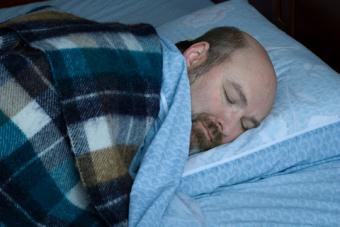
Do you need a snoring mouthpiece? Would you benefit from one? How effective is a mouthpiece for chronic snoring cases?
Snoring Mouthpiece
Snoring can be a chronic condition, a result of a cold or a symptom of a sleep disorder. Understanding how treatments work can help patients who suffer from snoring to find the treatment that is right for them.
Interview With Dr. Gary Richardson, Senior Research Scientist
Dr. Gary Richardson, Senior Research Scientist and staff physician at the Henry Ford Sleep Disorders and Research Center, sat down with LoveToKnow Sleep to answer our questions about snoring, mouthpieces and getting a good night's rest.
How do snoring mouthpieces help to reduce snoring?
Snoring occurs when the muscles lining the upper airway (the tongue and other muscles used in swallowing) relax during sleep. When these muscles relax, the airway narrows, making it harder to inhale. The soft tissues lining the airway vibrate in response to the greater negative pressures of inhalation, producing snoring. Fixed anatomic (skeletal) features and obesity contribute to the narrowing of the airway. A cold or allergic reaction can also result in airway narrowing and snoring.
Various dental appliances can limit or eliminate snoring by expanding the airway passage. The devices are usually mandibular advancing devices (MADs) which pull the lower jaw (mandible) forward, allowing more room in the back of the throat for airflow.
Is one design of sleep mouthpiece more successful than another?
The appropriateness of the mouthpiece device depends on the patient and the specific cause of the snoring. No one device has been shown to be superior to others in general application. Ideally, the selection of the mouthpiece would be made by a dentist or oral surgeon with experience managing snoring and who is familiar with all device options.
How hard is it to train the body to keep the mouthpiece in place while sleeping?
Most patients tolerate dental devices reasonably well. In multiple studies of compliance, roughly 70 percent of patients provided with a dental device are still using it after one year.
Are there any side effects to using a snoring mouthpiece?
The most commonly reported side effects of dental devices include jaw discomfort, tooth tenderness, excessive salivation or dry mouth. The problems most likely to prompt discontinuation of dental devices are persistent temporal-mandibular joint (TMJ) pain and malocclusion (a change in the position of the teeth).
Should people consult a physician before they invest in a snoring mouthpiece?
Patients should see their primary physician to assess whether their snoring is associated with obstructive sleep apnea. This assessment could include a sleep study to measure breathing during sleep and determine the severity of any underlying problem. The severity of snoring is not a reliable indicator of the the presence or absence of sleep apnea. Instead, daytime symptoms, most notably sleepiness, weight, and other potential manifestations of sleep apnea such as blood pressure need to be included in the assessment.
If a person suffers from obstructive sleep apnea, can they use a mouthpiece with or instead of CPAP?
Obstructive sleep apnea (OSA) differs from snoring in the extent of airway obstruction. If the airway narrows enough during sleep to prevent adequate airflow, the consequences are significantly greater than for snoring alone. Patients with OSA experience greater sleep disruption, greater daytime sleepiness and impairment, and significantly greater health consequences (e.g., cardiovascular disease) than do those with snoring alone.
Current guidelines of the American Academy of Sleep Medicine state that CPAP therapy remains the treatment of choice for patients with obstructive sleep apnea (OSA), but that oral appliances such as mouthpieces can be used in patients with mild to moderate sleep apnea who cannot or will not tolerate CPAP. In severe apnea, surgery should be considered as second line therapy after CPAP rather than a mouthpiece. In all patients with sleep apnea, regardless of treatment, it is important that regular reassessments be performed to guard against progression of the underlying disease.
There are no useful data on the use of mouthpieces in conjunction with CPAP in patients with OSA.
Who should not use a snoring mouthpiece?
There are no absolute contradindications to use of a properly selected and fitted dental device except, as noted above, severe sleep apnea should be treated with CPAP or surgery rather than a dental device as first line therapy.
What other tips can you offer individuals to help overcome problems associated with snoring?
In addition to those factors mentioned, there are other issues that can contribute to upper airway narrowing, snoring and sleep apnea. For example, alcohol, even small doses consumed close to bedtime, will enhance relaxation of the upper airway muscles and cause or worsen snoring. Other sedative drugs can do this as well; drugs used to facilitate sleep, including those available over the counter, can significantly worsen snoring. Conversely, weight loss, even in modest amounts, can have a significant positive effect.
Learn More About Snoring Treatments
Snoring keeps people awake and snoring treatments seek to help people who snore and their partners get a good night's sleep.
 |
 |
 |







